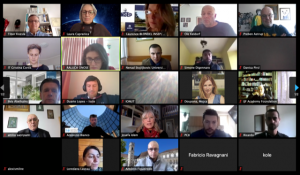Our Blog
Second Virtual EAS Café on Dual Career Migrating Athletes
Originating from the findings of the EU Collaborative Partnership “Athletic migration: Dual Career and qualification in sports (AMiD)” project (590400-EPP-1-2017-1-AT-SPO-SCP), the second EAS Virtual Cafè event focused on dual career migrating athletes, attracting 48 European dual career experts.
Cristina Cortis, Associate Professor and Rector’s Delegate for Sport at the University of Cassino and Lazio Meridionale (Italy), illustrated the AMiD project on dual career migrating (https://www.termedia.pl/Student-athlete-migration-A-systematic-literature-review,129,42089,1,1.html), its published literature review (https://blogi.eoppimispalvelut.fi/amid/description/) and expected publication of further information. She envisaged strong cooperation between sport bodies and educational stakeholders to develop a European dual career environment, which could facilitate the migration of student-athletes between the Member States.
Josefa Idem, the top-level kayak athlete with an outstanding achievement of 38 medals in Olympic Games (2 as a German and 6 as an Italian athlete), World and European Championships, described the challenges and opportunities of being a migrating top athlete who combined her long competitive career with political appointments and maternal role of two children. She considered the challenges as real opportunities, suggesting that youth athletes could profit from biographies of former athletes. As a psychologist and consultant of the Italian Soccer Federation, she also presented a cultural vision encompassing a lifelong education of all the actors in sports to support the holistic development of youth athletes as citizens.
Preben Astrup, the General Manager of the Danish Migration project “Get2sport”, illustrated the background, aims, activities, and benefits of a relevant and effective project for the integration of refugees in the sport clubs and schools all over Denmark. In presenting the fruitful cooperation with local refugee centres, municipalities, voluntary coaches, teachers and leaders, he highlighted the crucial role of parents in making “Get2sport” successful for the benefit of the youth athletes and the society at large. Indeed, the Get2sport project represents good practice for the integration of different culture and the advancement of local communities.
I n summarizing the outcomes of the café, Laura Capranica noted that the speakers moved from the holistic development of the athlete as a student to the holistic development of the society by means of education in and through sport. Thus, the participants were invited to attend the third EAS Virtual Cafè and the Annual Conference to be held in Lisbon, European Capital of Sport 2021.
n summarizing the outcomes of the café, Laura Capranica noted that the speakers moved from the holistic development of the athlete as a student to the holistic development of the society by means of education in and through sport. Thus, the participants were invited to attend the third EAS Virtual Cafè and the Annual Conference to be held in Lisbon, European Capital of Sport 2021.


